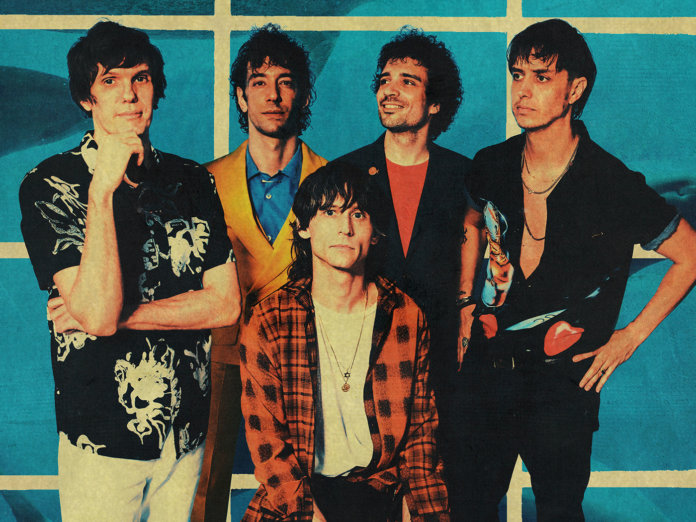It’s hard to pinpoint where precisely it occurred on his slide from bad to worse, but somewhere between the publication of Lizzy Goodman’s US rock scene oral history Meet Me In The Bathroom and his facing multiple accusations of sexual misconduct, Ryan Adams decided to air his feelings on Twitter about his sometime contemporaries The Strokes.
Apparently inspired by Liam Gallagher’s unmediated volleys in the medium, Adams described Strokes guitarist Albert Hammond Jr as a “horrible” songwriter (among the many compelling narratives in the Goodman book had been one of Adams introducing Hammond to heroin). He also observed singer Julian Casablancas as being “strung out on lasagne”. He struck a more depressing note when he observed that while his own albums were reliably making the Top 5 every time, those by “the guy in the Hawaiian shirt and the feather earring” (namely, Casablancas) were not so lucky.
It’s hard to imagine a character as hip and inscrutable as Julian Casablancas allowing such remarks to register on his dial, but it’s worth noting that The Strokes have not gone out of their way to make themselves immune from such criticism. At the band’s arguable peak in 2006, Casablancas departed for an extracurricular career that became increasingly diverse: solo album, sneaker ad campaign, Daft Punk collaboration, an absurdist post-hipster band called The Voidz.
The Strokes? According to a recent stage announcement, The Strokes “took the 2010s off”. Which is possibly news to the fans who bought their 2011 album Angles. There was an album in 2013 too, and an EP in 2016, and shows have been played. But the announcement confirmed what we gathered at the time: this was not a band exactly putting their back into it. Now, however, they’re back, and steps are taken here to remind us via studio banter (“The click was always in you, Fab…”) and a casual attitude to ending songs, that this remains a band of brothers in a room together, doing what they do best.
It’s a slightly illusory business. Acting as ever like a personal trainer for bloated creativity, producer Rick Rubin is on hand to perform his patented ritual of past-life regression, stripping away the layers to arrive at an essence. Duly, on several songs here Rubin helps peel back the years to reveal an energy and a passion that reminds you just how powerful was the band’s initial proposition. Opener “The Adults Are Talking” is a case in point, restoring the twin guitars of Nick Valensi and Albert Hammond to their patented new wave prog, while Casablancas rules the song with a wonderful falsetto.
In fine voice throughout, his songs aren’t far behind. His style ever to let a phrase carry a meaning beyond its weight, throughout he makes hooks in unlikely places (“I want new friends…” he sings on “Brooklyn Bridge To The Chorus”, “…but they don’t want me”). He retains undiminished his talent for wryly sketching the scene and then disappearing into The Strokes’ domain: the confusion of the night.
While there are familiar modes, the album also attempts to reconcile the band’s core sound with progressions in Casablancas’s musical interests since. “Eternal Summer” finds the band melding Clash-like stylistic fusions with their take on ’90s R&B. First track to be released, “At The Door”, meanwhile, is a synth epic designed to wrongfoot expectations, since it actively sounds, with its ’80s keyboard washes, like a Julian solo track. What drew us in here in the first place was the songs, however they were played, and this reminds you of the band’s intact talent. As the song gathers momentum, Casablancas draws a vignette of emotional brinkmanship: “Beg me not to go/Sinking like a stone/Use me like an oar/To get yourself to shore…” It’s a magnificent piece.
Rubin can help the band access their best qualities – the vocal melodies; the interlocking guitars; the irresistible momentum – but he and the band face unlikeable odds. As Oasis once were, the band are saddled with an unfairly huge expectation to provide the same jolt that they provided with their debut: giving shape to a time by force of musical charisma alone.
In this context, the album’s pacing reflects a slowing down towards realistic expectations. There’s a gentle drift from the jaunty (say “Bad Decisions”, a close cousin of Billy Idol’s “Dancing With Myself”) into the kind of mid-paced guitar brooding we find nearer the close with “Not The Same Anymore”. Here Casablancas adds the weight if not the wisdom of experience to the band’s nighttime patrols. “I fucked up…”
The best is saved for last. “Ode To The Mets” effortlessly recaptures the nonchalant accomplishment of the band’s finest moments: “I was bored with a guitar/I learned all your tricks/It wasn’t too hard.” A minute before the close, however, the band and the song change gear. As it moves to its end, a change of pace heralds as much a new era as it does a new section of the song. A stirring guitar riff begins as Casablancas sings the line, “The old times have been forgotten…”
Easier said than done, perhaps. But if you’re interested in the future of The Strokes as well as their past, it sounds like good news.



